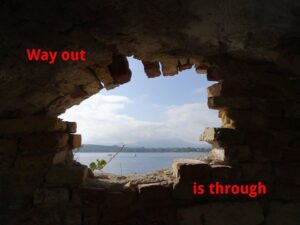Many years ago, being a young acolyte of capitalism and free enterprise, I fervently believed that the best means to improve the world was wealth. The path seemed simple and clear: build a company, in a ruthless struggle with other entrepreneurs, amass a multimillion-dollar fortune and – following the example of the Great Gummies of capitalism – donate it to charity, run under my enlightened guidance, of course.
Nostalgic break…
Fortunately, I’ve since gotten over it a bit.
The most important insight that helped me abandon this thinking was that the means one uses to achieve one’s goals greatly affects the achiever. And it’s not even about the proverbial hammer, which sees nails everywhere, although that too. But it’s about the fact that every action leaves a trace in us – our soul (or its functional equivalent), and in our surroundings. And these traces remain, accumulate, loop, and over time carry more weight than our intentions or long-range plans. So, yes – hell is paved with good intentions, is not a silly saying.
Now that we are building a new community, and when there is less and less timespace left for us to do silly things, I invite you – Dear Reader – to have a coversation about decent means leading to decent goals that TePeWu is currently setting for itself:
For ourselves: to cultivate freedom, solidarity, help and care for each other in a space safe from harmful interference. To each person according to their needs, from each according to their abilities.
For our surroundings: helping others face the challenges of civilization collapse.
For the world: mitigating the suffering and death of sentient beings, especially as a result of planetary omnicrisis.
Of course, it makes no sense for us to reinvent everything. Admittedly, we do not stand on the shoulders of giants, but on a great pyramid of equal and similar people who have accumulated knowledge over the centuries about what to do and what not to do to achieve such goals. To this knowledge and wisdom I refer today, with respect, though without humility.
For ourselves, attempting to create a healing, supportive and nurturing community, I refer to social permaculture.
The key insight of social permaculture is that, while changing individuals is indeed difficult, we can design social structures that favor beneficial patterns of human behavior. Just as, in a garden, we might mulch to discourage weeds and favor beneficial soil bacteria, in social systems we can attempt to create conditions that favor nurturing, empowering relationships.
Permaculture’s three core ethics are care for the earth, care for the people, and care for the future—that third ethic is also often framed as “fair share”: share surpluses and reduce consumption. These ethics can serve as a guideline for weighing our decisions and actions.
The simplest metaphor for a permaculture community is a “self-governing” (or rather, rewilded) garden, where the plants themselves decide how and where they want to grow. Unlike actual plants, human individuals have the ability (sometimes the compulsion) to plan and anticipate, so this rewilding will have some preconceived idea. But the basic approach remains the same: our community is a living ecosystem, and we are both its components, its builders and trustees.
For our surroundings, which we will be transforming, also physically, I refer to Convivial Technologies, also known as OSAT.
Joshua M. Pearce, The case for open source appropriate technology
Much of the widespread poverty, environmental desecration, and waste of human life seen around the globe could be prevented by known (to humanity as a whole) technologies, many of which are simply not available to those that need it. This lack of access to critical information for sustainable development is directly responsible for a morally and ethically unacceptable level of human suffering and death.
A solution to this general problem is the concept of open source appropriate technology or OSAT, which refers to technologies that provide for sustainable development while being designed in the same fashion as free and open source software. OSAT is made up of technologies that are easily and economically utilized from readily available resources by local communities to meet their needs and must meet the boundary conditions set by environmental, cultural, economic, and educational resource constraints of the local community.
This paper explores both the open source and appropriate technology aspects of OSAT to create a paradigm, in which anyone can both learn how to make and use needed technologies free of intellectual property concerns. At the same time, anyone can also add to the collective open source knowledge ecosystem or knowledge commons by contributing ideas, designs, observations, experimental data, deployment logs, etc.
It is argued that if OSAT continues to grow and takes hold globally creating a vibrant virtual community to share technology plans and experiences, a new technological revolution built on a dispersed network of innovators working together to create a just sustainable world is possible.
Convivial technologies are technologies that consider not only the availability of resources, knowledge and human labor; not only take into account (and close) the cycles of energy and matter exchange with the environment; convivial technologies go further, consciously shaping the social dynamics around each stage of their implementation. They promote the empowerment of users, desacralize knowledge and technical competence, and increase the agency of entire communities.
Their parents are the “Appropriate Technologies” and Open Source movements, and their godfather is Ivan Illich and his reflections on the appropriate use of technology. This is the kind of technology that is precisely appropriate for a cooperative and capitalism-free society.
For the world, on the other hand, we need a narrative framework that connects our local actions to the planetary context of the collapse of civilization. Such a framework is provided by Deep Adaptation movement.
Deep Adaptation is a concept, agenda, and international social movement. It presumes that extreme weather events and other effects of climate change will increasingly disrupt food, water, shelter, power, and social and governmental systems. These disruptions would likely or inevitably cause uneven societal collapse in the next few decades. The word “deep” indicates that strong measures are required to adapt to an unraveling of western industrial lifestyles. The agenda includes values of nonviolence, compassion, curiosity and respect, with a framework for constructive action.
Bendell added a fourth “R”, reconciliation, to the Deep Adaptation framework in 2019:
- Resilience: what do we most value that we want to keep, and how?
- Relinquishment: what do we need to let go of so as not to make matters worse?
- Restoration: what could we bring back to help us with these difficult times?
- Reconciliation: with what and whom shall we make peace as we awaken to our mutual mortality?
Deep Adaptation is part of a wider public conversation about the increasing frequency and severity of extreme weather events, global food insecurity, and the existential threats they pose. Several authors have asserted that whether one takes the pessimistic view of Deep Adaptation for the likelihood of societal collapse or a more optimistic view, the Deep Adaptation response of love-based action is appropriate, so that pessimists and optimists should work together.
The topic of societal collapse can generate overwhelming emotional responses. Bendell and Carr have sought to constructively address these strong emotions.

The essence of Deep Adaptation is to accept that the collapse of industrial civilization is already unfolding, and that its depth and duration are only moderately dependent on us. Hence the need to divide our energies judiciously between pressuring powers that be to try to mitigate and slow the collapse, preparing ourselves and our communities for the “downstairs slide” of gradual degradation of the infrastructure keeping us alive, and finally working together to create/recreate forms of social life better suited to the unknown world our successors will live in.
The first step is to accept the feeling of despair and helplessness. As Jem Bendell wrote, despair is a laxative for our minds, emptying them of metaphorical bullshit to make room for new, constructive ideas. If we avoid despair, we will never get through to the other side.

As we free ourselves from the pervasive state-capitalist culture and from the reactivity trap of the traditional anti-system approach, we need a new space of meaning for all our activities. I believe that the three dimensions I outlined above will create such a space for us. And the rest – solvitur ambulando.
